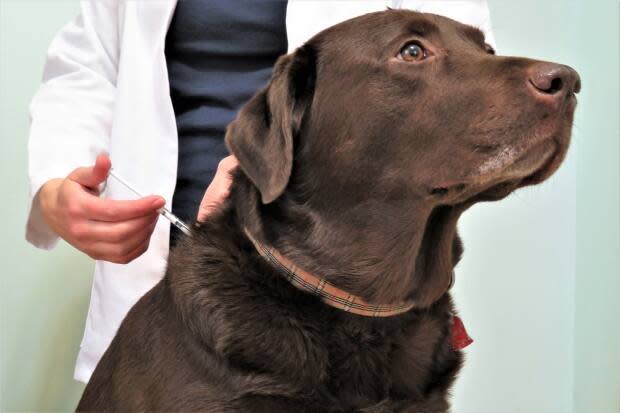Vaccine misinformation spreading to pet owners, too, B.C. veterinarian says
It's not just parents of human children. A B.C. veterinarian says he's seeing a growing number of pet owners who are resistant to potentially life-saving vaccinations because of online misinformation.
Kelowna's Dr. Marco Veenis, director of the Society of B.C. Veterinarians, told CBC it's something he's been noticing for the last five to 10 years.
"Some owners are concerned that pets are being overly vaccinated or that vaccines can have side effects for their pets, just like in humans," Veenis said.
"Usually people have done online research, and of course if you google vaccines, there's a lot of information out there and a lot of misinformation as well."
Just this week, the B.C. SPCA urged dog owners to check their pets' history and make sure their vaccinations are up to date after an outbreak of parvovirus downtown Vancouver.
Six puppies have been diagnosed with the potentially fatal disease in as many weeks, and by Thursday, four of them were dead.

There's been no suggestion that the outbreak is connected to misinformation about vaccines, but Veenis said owners need to be aware of the consequences of refusing immunizations.
"I've been in practice for more than 30 years, and I've seen my fair share of outbreaks of infectious diseases. It never ends well for the pets," he said.
'Make an informed decision'
The owners he's speaking with often have heard misleading claims that vaccines are not effective, or that they can cause diseases of the immune system. Others are concerned by research showing that certain vaccines can trigger cancer in cats in very rare cases.
Some anti-vaccination conspiracy sites have even falsely suggested that vaccines can cause autism-like symptoms in dogs, mirroring a thoroughly debunked theory about human children and the vaccine for measles, mumps and rubella.
Veenis said when an owner approaches him with concerns about vaccines, he tries to have a frank discussion about the pros and cons. He asks them about how much time their pets spend outdoors, interacting with other animals and tries to give them tailor-made advice.
"Nobody's forced to vaccinate their pets, but at the same time, if you love your pets and your pet goes outdoors … it's a good idea to at least get the information that you need to make an informed decision," Veenis said.

Meanwhile, the SPCA's senior manager of animal health, Dr. Emilia Gordon, says pets often go unvaccinated simply because their owners forget to make appointments.
"Not vaccinating is not usually a deliberate choice in puppies. I would say it's more about accessibility and timing and awareness," Gordon said.
"However, we can't let our guard down because it is the unvaccinated puppies that are dying and it's completely preventable."
The last Thursday morning of every month, the SPCA offers free vaccines and basic preventive care in Vancouver's Oppenheimer Park for pets whose owners are homeless or live in SROs, single-room occupancy hotels.

